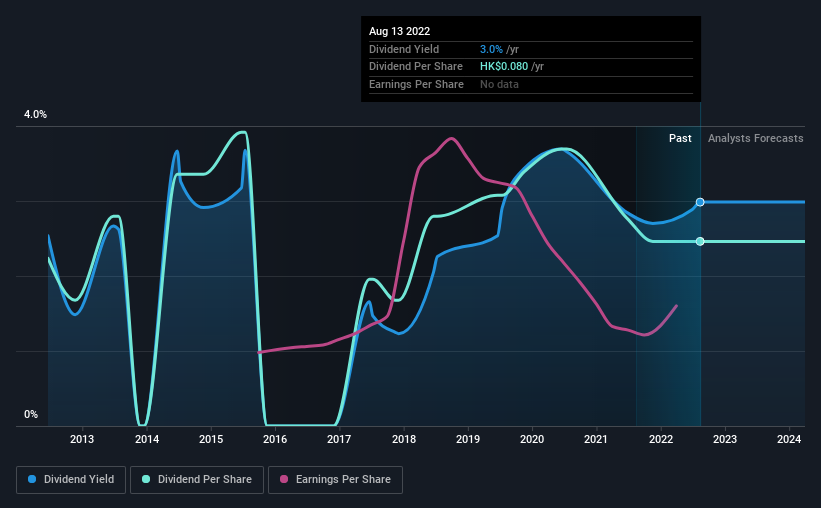
HKR International Limited's (HKG:480) investors are due to receive a payment of HK$0.05 per share on 19th of September. Including this payment, the dividend yield on the stock will be 3.0%, which is a modest boost for shareholders' returns.
Check out our latest analysis for HKR International
HKR International's Payment Has Solid Earnings Coverage
While yield is important, another factor to consider about a company's dividend is whether the current payout levels are feasible. Based on the last payment, HKR International was earning enough to cover the dividend, but free cash flows weren't positive. In general, we consider cash flow to be more important than earnings, so we would be cautious about relying on the sustainability of this dividend.
Over the next year, EPS is forecast to fall by 7.2%. If the dividend continues along recent trends, we estimate the payout ratio could be 12%, which we consider to be quite comfortable, with most of the company's earnings left over to grow the business in the future.

Dividend Volatility
The company's dividend history has been marked by instability, with at least one cut in the last 10 years. The dividend has gone from an annual total of HK$0.0727 in 2012 to the most recent total annual payment of HK$0.08. Its dividends have grown at less than 1% per annum over this time frame. Modest growth in the dividend is good to see, but we think this is offset by historical cuts to the payments. It is hard to live on a dividend income if the company's earnings are not consistent.
We Could See HKR International's Dividend Growing
With a relatively unstable dividend, it's even more important to evaluate if earnings per share is growing, which could point to a growing dividend in the future. HKR International has impressed us by growing EPS at 5.4% per year over the past five years. A low payout ratio and decent growth suggests that the company is reinvesting well, and it also has plenty of room to increase the dividend over time.
In Summary
In summary, while it's good to see that the dividend hasn't been cut, we are a bit cautious about HKR International's payments, as there could be some issues with sustaining them into the future. While the low payout ratio is redeeming feature, this is offset by the minimal cash to cover the payments. We would be a touch cautious of relying on this stock primarily for the dividend income.
It's important to note that companies having a consistent dividend policy will generate greater investor confidence than those having an erratic one. Still, investors need to consider a host of other factors, apart from dividend payments, when analysing a company. Just as an example, we've come across 3 warning signs for HKR International you should be aware of, and 1 of them makes us a bit uncomfortable. Is HKR International not quite the opportunity you were looking for? Why not check out our selection of top dividend stocks.
Valuation is complex, but we're here to simplify it.
Discover if HKR International might be undervalued or overvalued with our detailed analysis, featuring fair value estimates, potential risks, dividends, insider trades, and its financial condition.
Access Free AnalysisHave feedback on this article? Concerned about the content? Get in touch with us directly. Alternatively, email editorial-team (at) simplywallst.com.
This article by Simply Wall St is general in nature. We provide commentary based on historical data and analyst forecasts only using an unbiased methodology and our articles are not intended to be financial advice. It does not constitute a recommendation to buy or sell any stock, and does not take account of your objectives, or your financial situation. We aim to bring you long-term focused analysis driven by fundamental data. Note that our analysis may not factor in the latest price-sensitive company announcements or qualitative material. Simply Wall St has no position in any stocks mentioned.
About SEHK:480
HKR International
An investment holding company, invests in, develops, and manages real estate properties in Hong Kong, Mainland China, Japan, and Southeast Asia.
Slightly overvalued with limited growth.


